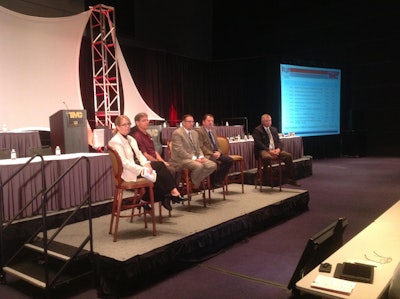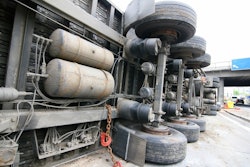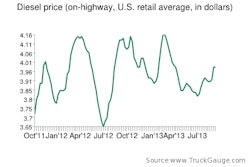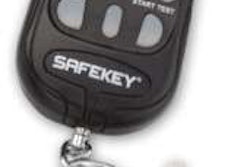 FMCSA Administrator Anne Ferro; Maverick Transport VP Mike Jeffres; Wal-Mart Transportation Regional Maintenance Manager Eric Benge; Con-way Freight Maintenance Director Tim Staroba; D&D Sexton Maintenance Director Ed Boles; and Pennsylvania State Police Corporal Richard Koontz made up the “CSA and its impact on maintenance” panel discussion held at the Technology and Maintenance Council meeting in Pittsburgh this week.
FMCSA Administrator Anne Ferro; Maverick Transport VP Mike Jeffres; Wal-Mart Transportation Regional Maintenance Manager Eric Benge; Con-way Freight Maintenance Director Tim Staroba; D&D Sexton Maintenance Director Ed Boles; and Pennsylvania State Police Corporal Richard Koontz made up the “CSA and its impact on maintenance” panel discussion held at the Technology and Maintenance Council meeting in Pittsburgh this week.Maintenance stands supreme when it comes to compliance and low scores with the Federal Motor Carrier Safety Administration’s Carrier Safety Compliance, Safety, Accountability program, says the agency’s current administrator, Anne Ferro.
Since CSA began in 2010, Ferro says the trucking industry has seen the most dramatic reduction in roadside violations in more than a decade, with vehicles violations per roadside inspection down by nearly 14 percent and driver-specific violations per roadside inspection down 17 percent.
“When you think about putting CSA in the context of safety, maintenance is at the foundation of that effort,” Ferro notes. “FCMSA’s number one goal is safety: We want to ensure that every trip is a safe trip every time. And we think CSA is bridging multiple worlds in that process. And the nation’s fleet maintenance professionals deserve a lot of credit for that; making older equipment work safely while learning to understand and use new technology in pursuit of low CSA scores and consistent safe vehicle operation.”
Ferro was part of a panel presented at the Technology and Maintenance Council’s annual fall meeting in Pittsburgh this week. The panel discussion, titled “CSA and its impact on maintenance,” was chaired by Mike Jeffress, vice president of maintenance for Maverick Transport.
Other panelists were Eric Benge, senior regional maintenance manager for Wal-Mart Transportation; Tim Staroba, director of maintenance for Con-way Freight; Ed Boles, director of maintenance for D&D Sexton; and Corporal Richard Koontz with the Pennsylvania State Police.
Panelists all agreed that integration of CSA regulations has required cultural shifts inside their organizations. The result, Jeffress noted, has been a consistent weeding out of poor performers in all areas, from drivers to technicians to fleets down to the law enforcement officers carrying out vehicle inspections.
“Before CSA, we were using behavior-based safety programs,” said Staroba. “It was a very punitive system when things went wrong. But then we realized that our people weren’t the problem. It was our processes. So, in order to comply with CSA, we changed them. Now, we seek to involve the guys who actually do the work or drive the trucks. We’ve got them involved in writing processes because they do the work. So now, the rules for everything we do are written by the people who do the job. It was a major cultural shift for our company.”
Benge says procedural changes were also necessary at Wal-Mart Freight in order to meet CSA requirements. “It was really more of a communication problem for us,” he said. “We payed a lot of attention to roadside failures and breakdowns. But a lot of that information flowed back to our safety department and wasn’t getting communicated to our maintenance people. So we began to work on that communication in order to start driving some improvements and directly address our CSA scores. We’ve implemented new procedures and policies based on that information. And it has all really enhanced our culture and the relationships between various departments in our company. Drivers now have ownership for violations. So we’ve made sure they understand that better communication — particularly with maintenance — is key to preventing and handling these issues.”
Koontz said CSA has forced the Pennsylvania State Police to become more detailed in its roadside inspections and reporting. “The biggest change for me has been training my people to accurately record violations so we can communicate them back to fleets,” he said. “A good example are engine oil leaks; In the past, an office could merely cite ‘oil leak’ as a violation. That’s not good enough anymore: It’s too generic. I need details. It’s a different world now and I need you to be clear in your reporting.”
Koontz says the Pennsylvania State Police conducted 120,000 vehicle inspections last year, with about 40 percent of them resulting in a cited violation.
“I can’t prove this, but I think we’re handing our CSA decals in record numbers,” he said. “Fleets that are in compliance want to be recognized for that. And I tell my people time and time again, all truck fleets want — like any industry — is a level playing field. And CSA does that. Because now, the inspections are the same in Texas, Toronto, Mexico City or Pennsylvania.”
“I know our inspections are getting better,” Koontz continues. “We’re not seeing the generic violations like we used to. We’ve stepped our testing to comply with CSA. And that’s been hard for some veteran officers to accept. I can tell you that we’ve de-certified some officers as a result and we’ve lost some officers who didn’t like the way the system has changed. Because it’s not a numbers game for us anymore. And I think the trucking industry is getting a lot better — and safer — as a result.”











